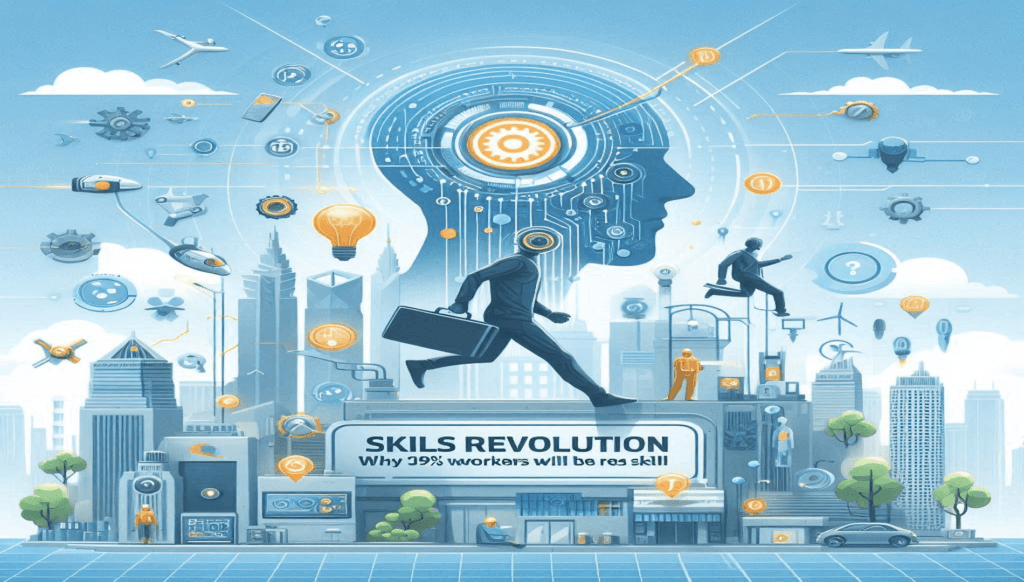
The world of work is undergoing a seismic shift. By 2030, 39% of workers will need to reskill to keep up with the rapid changes brought on by technological advancements, economic uncertainty, and the green transition. This skills revolution is not just a buzzword—it’s a reality that businesses, governments, and individuals must confront head-on. This article will explore why the skills revolution is happening, what skills will be in demand, and how workers and organizations can prepare for the future.
What’s Driving the Skills Revolution?
The skills revolution is being fueled by several macrotrends that are reshaping the global labour market. According to the Future of Jobs Report 2025, these trends include:
- Technological Advancements: Artificial intelligence (AI), robotics, and automation are transforming industries at an unprecedented pace. For instance, 86% of employers expect AI and information processing technologies to significantly impact their businesses by 2030.
- The Green Transition: Climate change mitigation and adaptation efforts are creating demand for new roles, such as renewable energy engineers and environmental specialists.
- Economic Uncertainty: Rising costs of living and slower economic growth are forcing businesses to rethink their workforce strategies.
- Demographic Shifts: Aging populations in high-income economies and growing working-age populations in lower-income countries are altering the global labour supply.
These trends are not just reshaping jobs—they’re redefining the skills needed to thrive in the future.
The Skills Gap: A Growing Challenge
The skills gap is one of the most pressing challenges of the skills revolution. Employers are struggling to find workers with the right skills, and workers are struggling to keep up with the pace of change. According to the report, 63% of employers identify skills gaps as a major barrier to business transformation.
But what exactly are these skills gaps? Let’s break it down:
Skills Revolution: Top Skills in Demand by 2030
AI and Big Data:
With the rise of generative AI and data-driven decision-making, skills in AI and big data are becoming essential. 87% of employers expect these skills to grow in importance.
- Networks and Cybersecurity: As cyber threats increase, so does the demand for cybersecurity experts.
- Technological Literacy: Even non-technical roles will require a basic understanding of technology.
- Creative Thinking: In a world dominated by automation, creativity will set humans apart.
- Resilience, Flexibility, and Agility: The ability to adapt to change will be crucial in an unpredictable job market.
On the flip side, skills like manual dexterity and endurance are expected to decline in importance, with 24% of employers foreseeing a decrease in their relevance.
Skills Revolution: The Role of Reskilling and Upskilling
Reskilling and upskilling are no longer optional—they’re essential. The report reveals that 50% of workers have already completed some form of training, up from 41% in 2023. However, the scale of the challenge remains significant.
The Reskilling Imperative
If the global workforce were represented by 100 people:
- 59 would need training by 2030.
- 29 could be upskilled in their current roles.
- 19 could be reskilled and redeployed within their organizations.
- 11 would be unlikely to receive the necessary training, putting their employment prospects at risk.
This data underscores the urgent need for businesses to invest in reskilling programs.
How Employers Are Responding
- Upskilling the Workforce: 85% of employers plan to prioritize upskilling their workforce.
- Hiring New Talent: 70% of employers expect to hire staff with new skills.
- Transitioning Employees: 51% plan to transition staff from declining to growing roles.
In my opinion, businesses that fail to invest in reskilling risk falling behind in the race for talent.
Skills Revolution: The Human-Machine Frontier: Collaboration Over Replacement
One of the most intriguing aspects of the skills revolution is the evolving relationship between humans and machines. While automation is expected to reduce the proportion of tasks performed by humans, human-machine collaboration is on the rise.
Automation vs. Augmentation
- Automation: By 2030, 34% of tasks are expected to be performed by technology, up from 22% today.
- Augmentation: 33% of tasks will involve human-machine collaboration, up from 30% today.
This shift highlights the importance of designing technology to complement human skills rather than replace them. For example, generative AI can enhance human creativity and problem-solving, but it cannot replicate the emotional intelligence and empathy humans bring.
The Green Transition: A New Frontier for Skills
The green transition is not just about saving the planet—it’s also about creating jobs. Roles like renewable energy engineers, environmental engineers, and sustainability specialists are among the fastest-growing jobs.
Green Skills on the Rise
- Environmental Stewardship: This skill has entered the top 10 fastest-growing skills for the first time.
- Renewable Energy Expertise: Demand for roles in renewable energy is expected to surge as countries ramp up their climate mitigation efforts.
However, the supply of green skills is struggling to keep up with demand. Between 2022 and 2023, the number of job postings requiring green skills rose by 22%, while the number of workers acquiring these skills increased by only 12%.
Skills Revolution: The Role of Public Policy and Education
Governments and educational institutions have a critical role to play in the skills revolution. According to the report, 55% of employers see funding for reskilling and upskilling as the most impactful public policy intervention.
Key Policy Recommendations
- Invest in Education: Improving public education systems can help prepare the next generation for the jobs of the future.
- Promote Lifelong Learning: Governments should encourage continuous learning through subsidies and incentives.
- Support Workforce Transitions: Policies that facilitate the transition from declining to growing roles can help mitigate job displacement.
In my view, public-private partnerships will be essential to bridge the skills gap and ensure a smooth transition to the future of work.
Here’s What I Think
The skills revolution is both a challenge and an opportunity. On one hand, it’s daunting to think that 39% of workers will need to reskill by 2030. On the other hand, this revolution presents a unique chance to redefine work, create new opportunities, and build a more inclusive and sustainable economy.
I believe that businesses, governments, and individuals must work together to navigate this transition. Employers need to invest in reskilling and upskilling, governments must create supportive policies, and workers should embrace lifelong learning.
The future of work is not set in stone—it’s something we can shape. By embracing the skills revolution, we can build a workforce that’s not only prepared for the challenges of tomorrow but also capable of driving innovation and growth.
Sources of Insights
- World Economic Forum. (2025). The Future of Jobs Report 2025.

Ajay Dhage is a seasoned talent acquisition leader with over 20 years of experience in Talent Acquisition and Workforce Strategy across the oil and gas, EPC, and renewables sectors. As Talent Acquisition Lead for a global Oil & Gas EPC company in India, he manages the end-to-end hiring lifecycle for complex, multi-disciplinary projects, from sourcing and assessment to onboarding and workforce planning. Known for his customer-focused approach and innovative use of AI and data in hiring, Ajay focuses on building future-ready workforces and resilient leadership pipelines. Through ajayable.com, he shares insights, trends, and practical frameworks to help HR professionals, organisations, and recruiters excel in a rapidly evolving, competitive talent landscape.
Leave a Reply